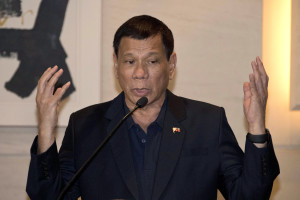YOKOHAMA, Japan—The Asian Development Bank is set to finance five water projects in the Philippines through grants totaling $770 million over the next three years aside from extending technical assistance to a project aimed at improving and modernizing Cebu City’s solid waste management.
A document provided to reporters showed that in the ADB’s pipeline of projects to be financed during the period 2017-2019 were five projects aimed at ensuring water security in the Philippines.
For the Mindanao Development Program (formerly Bangsamoro Development Program), the ADB will grant a $100-million loan this year; in 2018, $70 million for the Solid Waste Management Sector Project on top of $100 million for the Metro Manila Water and Sanitation Program (formerly Metro Manila Wastewater Improvement Project); $100 million for the Angat Water Transmission Improvement Project and $400 million for the Lake Laguna Flood Management/Integrated Water Resource Management Program in 2019.
“Our focus for this year is to scale up and expand our water projects,” Amy Leung, deputy director general at the ADB’s sustainable development and climate change department, told reporters in a briefing yesterday.
Meanwhile, ADB’s assistance to Cebu City will fund a prefeasibility study involving the review of economic, legal, technical, social and environmental aspects. The study will help city authorities prepare a strong project concept, with the private sector expected to design, build, finance, operate and maintain the project.
The project, which will be implemented through a public-private partnership (PPP) scheme, was introduced to the ADB by the city government of Yokohama through its Yokohama Partnership of Resources and Technologies (Y-PORT).
“PPPs will play a critical role for urban areas in Asia and the Pacific to improve infrastructure delivery and quality of life for residents,” said Ryuichi Kaga, head of the ADB’s office of public-private partnership.
The assistance will be provided under Asia-Pacific Project Preparation Facility established in 2015, which the lender said was a “multi-donor trust fund managed by ADB to help developing Asia and the Pacific prepare, structure, and place bankable PPP projects in the market.”
Across the Asia-Pacific region, in the ADB’s pipeline this year are $4.2 billion in loans for water projects. Last year, the ADB’s water operations approved $2.4 in investments.
In a report titled “Asian Water Development Outlook 2016” released last August, the ADB said the Philippines, Bangladesh, Burma (Myanmar), Pakistan and Vietnam had difficulty providing better urban water services to build more livable cities.
In the report’s National Water Security Index, the Philippines scored 40.4 out of a perfect score of 100 and ranked 38th out of the 48 Asia-Pacific countries covered, already an improvement from the country’s score of 35 in 2013.
The index covered five key dimensions of national water security—economic, environment, household, resilience and urban.
According to the report, economic losses due to low water security as a percentage of gross domestic product range between zero and 2 percent in the Philippines, China, Indonesia, Malaysia, South Korea as well as Vietnam.


